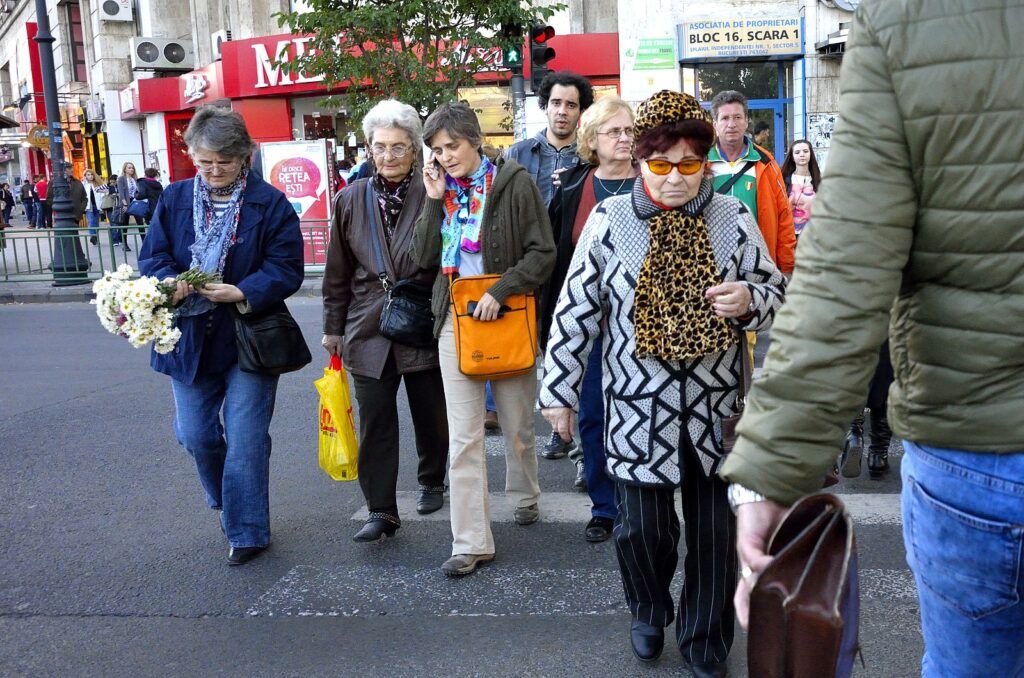Poll: Russia’s nuclear saber-rattling is rattling neighbors’ nerves
By Lauren Sukin, Alexander Lanoszka | April 15, 2022
 People walking in Bucharest, Romania. Credit: Jake Stimpson. Accessed via Wikimedia Commons. CC BY 2.0.
People walking in Bucharest, Romania. Credit: Jake Stimpson. Accessed via Wikimedia Commons. CC BY 2.0.
While Ukrainians fight or flee Russia’s bombardment of their cities, many Europeans feel a palpable, renewed nuclear fear. Russian President Vladimir Putin ordered the country’s nuclear forces on high alert. Russian troops forced Chernobyl Nuclear Power Plant employees to work a 600-hour shift at gun point. They also attacked the Zaporizhzhia Nuclear Power Plant, causing structural damage and starting a fire. Meanwhile, Romanians have spent millions for the emergency production of radiation-blocking iodine pills, Poland has signaled its willingness to host US tactical nuclear weapons, and officials from the Baltics have urged NATO to commit to intervene if Russia uses weapons of mass destruction.
How has the war reshaped Central and Eastern Europeans’ perceptions of nuclear risk? In March, we polled citizens in Poland, Romania, Latvia, Lithuania, and Estonia with the goal of learning more about their thoughts on nuclear weapons.[1] Our findings paint a mixed picture. Citizens fear the nuclear implications of Russia’s war in Ukraine, abhor nuclear weapons, and worry about Russian nuclear safeguards. At the same time, they want their governments to acquire nuclear weapons.
Russia waved the nuclear saber. On March 26, former Russian President Dmitry Medvedev laid out the country’s conditions for a nuclear launch: a nuclear attack on Russia or its allies, an attack on critical infrastructure that “will have paralyzed [Russian] nuclear deterrent forces,” or any “act of aggression committed against Russia and its allies, which jeopardized the existence of the country itself, even without the use of nuclear weapons.”
Moscow emphasized its right to use nuclear weapons in response to non-nuclear “existential” threats. Kremlin spokesperson Dmitry Peskov recently warned that Moscow “can use and we will actually use nuclear weapons to eliminate the threat for the existence of our country.”
To some, an “existential threat” requirement may sound reassuring. But it should not. Russian disinformation narratives—such as when Russian media falsely accused Ukraine of building bioweapons and seeking a nuclear “dirty bomb”—could easily become flimsy excuses for existential threats. Moreover, a sufficiently humiliating defeat in Ukraine could arguably be interpreted as a threat to Russia’s “existence,” especially given the Kremlin’s talk about Ukraine as rightful Russian territory.
And, of course, a direct challenge to Russian President Vladimir Putin’s regime would likely be considered existential. This may be why White House officials quickly clarified that President Joe Biden’s warning that Putin “cannot remain in power” was meant only as a lament about Putin’s atrocities, not as a plan to oust him.
Do Europeans fear a Russian nuclear attack? On March 15, 2022, we polled more than 1,000 Central and Eastern European citizens on their understandings of and attitudes towards regional nuclear threats. Our survey depicts a moment in time—just weeks after the full-fledged invasion, when the war was still new. As the war has evolved, perceptions about it may have changed. In addition, while we polled nationally representative samples in Poland and Romania, we could not do so in the Baltic states, making it more difficult to draw conclusions about public preferences in Latvia, Lithuania, and Estonia. Still, our polling represents a valuable snapshot of public views in the region during the first weeks of the war. The result suggest that Russia’s neighbors do not trust the Kremlin to exercise caution in its nuclear affairs.
In Latvia, Lithuania, Estonia, Romania, and Poland, between 77 and 93 percent of respondents distrust Russian nuclear decision-making. In all of these countries except Latvia, a majority “strongly distrust” Russia’s nuclear stewardship. These findings suggest that Eastern Europeans worry—or at least they did in mid-March—that Putin’s nuclear threats could be more than just talk. Such dread goes hand-in-hand with broader anti-Russia views. Almost nine out of 10 people described their view of Russia as “unfavorable.”
Yet Central and Eastern Europeans have a high level of confidence in NATO, even as the war in Ukraine has tested the alliance. In each of these countries, between 66 and 85 percent of survey respondents said they trusted NATO’s nuclear decision-making—a stark contrast to their distrust of Russia. Their support for unilateral US decision-making around nuclear weapons fell in a similar range.
Central and Eastern Europeans also felt strong political alignment with NATO and the United States. Nearly 90 percent expressed pro-democracy and pro-NATO views. More than two-thirds characterized the US military as “morally good.” These positive views help explain the region’s increased coordination with and contributions to NATO. They also suggest these expanded commitments are not just symbolic. In fact, almost two-thirds said that they would want their country to contribute if NATO forces fought against a Russian invasion of a NATO state.
These public opinion measures, like most, omit nuance. Still, they suggest that Russia’s nuclear threats raised alarm. Whether Putin’s nuclear rhetoric is a “madman” strategy or just evidence of a madman, those living nearby are—with reason—scared.
Europeans are nervous about the emergent nuclear threat. Now what? Nuclear weapons have shaped the ongoing war. When Putin warned that a NATO intervention would invite “consequences you have never seen,” for example, many understood his words as a thinly veiled nuclear threat. Russia’s nuclear forces have also kept US and NATO soldiers at bay. Meanwhile, Central and Eastern European leaders are likely aware of the asymmetry between Russia’s massive nuclear arsenal and their own militaries.
Despite overwhelming support for Ukraine, NATO has stayed on its side of the border. Biden insists that American soldiers will not fight in Ukraine. Although Ukrainian President Volodymyr Zelenskyy has repeatedly called for a NATO-imposed “no fly zone,” NATO has not agreed out of fear that doing so would escalate the conflict into a broad Russia-NATO fight.
Ukraine has mustered impressive force to resist and repel Russian operatives. Still, the war may have unfolded differently if nuclear history had been different. After securing independence from the Soviet Union in 1991, Ukraine was “born nuclear,” which means that it was left with a robust stockpile from the collapsed Soviet Union. Yet Ukraine relinquished its weapons and signed the Nuclear Non-Proliferation Treaty. It did so in exchange for the 1994 Budapest Memorandum—a document in which Russia, the United States, and the United Kingdom declared their (non-binding) commitment to Ukrainian independence, sovereignty, and borders.
The memorandum was never intended to be a true security guarantee. It was not an international treaty nor was it ratified by national legislatures. With historical hindsight, other US partners teetering in dangerous nuclear environments may nevertheless have learned an inadvertent dangerous lesson about the “value” of membership in the nuclear club.
Indeed, across Eastern and Central Europe, formerly frosty attitudes about nuclear acquisition may be thawing. Half of all respondents in our poll wanted their countries to develop nuclear weapons.
Nuclear proliferation looked least desirable in Lithuania and Latvia—only 38 percent and 40 percent favored them, respectively. In Romania and Estonia, the public was split at 45 percent and 51 percent, respectively. In Poland, which boasts both by far the largest military and economy of the surveyed states, almost two-thirds of the public openly declared their support for a national nuclear weapons program.
These percentages are high enough that citizens are unlikely to act as a strong restraint on leaders seeking nuclear weapons, although this is unlikely, as well as largely impractical, at least in the Baltic states. In Poland, robust public support for building nuclear weapons could galvanize political conversations, as has been the case in South Korea. Although nuclear proliferation to date hasn’t been a major topic in Polish politics, on occasion Poland has expressed interest in hosting US nuclear weapons. A key Polish leader once even advocated for a “Eurodeterrent,” or a nuclear sharing program between European states. Such a program would provide nuclear deterrence for Europe, independent of the US nuclear arsenal.
Crucially, citizens’ expectations about the costs of proliferation are likely misinformed. Almost two-thirds think acquiring nuclear weapons would not prompt the US military to change its assistance to their country. Yet the United States has previously threatened to withdraw military support from allies who sought nuclear weapons. Similarly, only one-fourth of survey respondents anticipated that the United States would impose sanctions in response to nuclear weapon acquisition, even though such sanctions would be likely. If Europeans understood the costs of proliferation, they might not be as eager to support nuclear weapons acquisition.
Public support for nuclear proliferation is not driven by a perceived need for a stronger NATO nuclear presence; only about one-third of survey respondents approved of NATO stationing tactical nuclear weapons in their country. Instead, many citizens preferred that their country acquire nuclear capabilities and the accompanying control over when and why to use them.
A pro-nuclear European public should proceed with caution. Central and Eastern Europeans are not necessarily signaling nuclear hawkishness, despite these pro-proliferation views. Many oppose nuclear weapons for ethical reasons. Across our survey, 85 percent of respondents reported that there were no situations in which using nuclear weapons would be morally justified.
Respondents were not only repulsed by the prospect of nuclear use, but they also expressed their belief in other prominent, pacifistic norms. For example, more than three-quarters agreed that “the use of military force only makes problems worse,” while almost all touted the importance of international law which, at least debatably, limits nuclear use.
Central and Eastern Europeans may be warming up to nuclear weapons not out of a desire for militancy but in response to renewed fears about Russian nuclear threats. They may believe that responsible nuclear stewardship could help avert nuclear disaster. But if the geopolitical situation continues to worsen, support for nuclear weapons acquisition, however ill-considered, may grow.
[1] We conducted an online public opinion survey using Lucid’s Marketplace platform in Romania, Poland, Latvia, Lithuania, and Estonia. 1,385 people responded. The sample is nationally representative (using block quotas on age and gender) in Romania and Poland but not in the Baltic countries. The samples were balanced on key demographics and attitudes, such as political ideology. Our results control for these variables.
Editor’s note: An earlier version of this article misstated a fact about Poland. This has been corrected.
Together, we make the world safer.
The Bulletin elevates expert voices above the noise. But as an independent nonprofit organization, our operations depend on the support of readers like you. Help us continue to deliver quality journalism that holds leaders accountable. Your support of our work at any level is important. In return, we promise our coverage will be understandable, influential, vigilant, solution-oriented, and fair-minded. Together we can make a difference.
Keywords: Estonia, Latvia, Lithuania, Poland, Romania, Russia, Ukraine, nuclear risk, nuclear weapons
Topics: Nuclear Risk, Nuclear Weapons
















Does this poll have data tables to back it up?